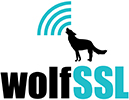-
Notifications
You must be signed in to change notification settings - Fork 833
Debugging
wolfSSL User Manual - Chapter 8
wolfSSL (formerly CyaSSL) has support for debugging through log messages in environments where debugging is limited. To turn logging on use the function wolfSSL_Debugging_ON() and to turn it off use wolfSSL_Debugging_OFF(). In a normal build (release mode) these functions will have no effect. In a debug build, define DEBUG_WOLFSSL to ensure these functions are turned on.
As of wolfSSL 2.0, logging callback functions may be registered at runtime to provide more flexibility with how logging is done. The logging callback can be registered with the following function:
int wolfSSL_SetLoggingCb(wolfSSL_Logging_cb log_function);
typedef void (*wolfSSL_Logging_cb)(const int logLevel,
const char *const logMessage);The log levels can be found in wolfssl/wolfcrypt/logging.h, and the implementation is located in logging.c. By default, wolfSSL logs to stderr with fprintf.
wolfSSL tries to provide informative error messages in order to help with debugging.
Each wolfSSL_read() and wolfSSL_write() call will return the number of bytes written upon success, 0 upon connection closure, and -1 for an error, just like read() and write(). In the event of an error you can use two calls to get more information about the error.
The function wolfSSL_get_error() will return the current error code. It takes the current WOLFSSL object, and wolfSSL_read() or wolfSSL_write() result value as an arguments and returns the corresponding error code.
int err = wolfSSL_get_error(ssl, result);To get a more human-readable error code description, the wolfSSL_ERR_error_string() function can be used. It takes the return code from wolfSSL_get_error and a storage buffer as arguments, and places the corresponding error description into the storage buffer (errorString in the example below).
char errorString[80];
wolfSSL_ERR_error_string(err, errorString);If you are using non blocking sockets, you can test for errno EAGAIN/EWOULDBLOCK or more correctly you can test the specific error code for SSL_ERROR_WANT_READ or SSL_ERROR_WANT_WRITE.
For a list of wolfSSL and wolfCrypt error codes, please see Appendix C (Error Codes).
